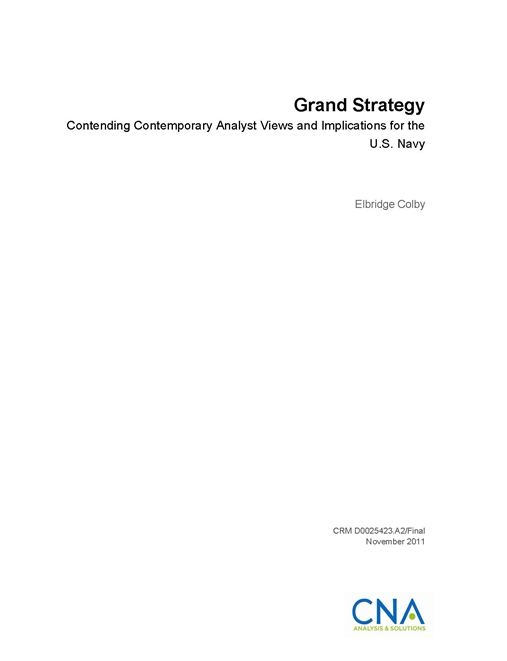A “grand strategy” is an overarching plan to employ all elements of national power to advance and fulfill a state’s security-related objectives in the foreign sphere. At its core, a grand strategy outlines the objectives a state seeks, and provides guidance on how the state will achieve them. In early 2011, the Chief of Naval Operations’ Strategic and Planning Division (OPNAV N51) requested that CNA review the ongoing academic debate pertaining to possible evolutions in US grand strategy.
Discussions on this issue have taken on renewed salience in recent years, in light of the rapidly changing strategic environment. Proposals for the most appropriate American grand strategy fall into four categories: hegemony, selective engagement, offshore balancing, and integration of American strategy into collective efforts. These categories differ markedly in their implications for the country, the U.S. armed forces, and the U.S. Navy. Two other categories—isolationism (an oft-mentioned contender in political debate), and world government—both provide intellectually coherent approaches to a grand strategy but are not serious candidates in the current discourse.
A grand strategy of hegemony
Proponents of a grand strategy of pursuing hegemony argue that the international system can be stable and American interests effectively safeguarded only if the United States seeks to attain and maintain hegemony—that is, if it has the ability and willingness to dominate other states and thus dictate the “rules of the road” of the international system. The military requirements of this strategy are extremely demanding, as it means that the United States must be able to defeat and impose its will on any individual or combination of states in any contingency. Critics of the strategy contend that it is unnecessarily ambitious and will either cause or accelerate America’s decline. The strategy would place significant demands upon the Navy and would logically require substantial funding for maritime forces; it would, however, also require very strong ground and air forces and thus would not necessarily privilege naval priorities.
A grand strategy of selective engagement
Advocates of a grand strategy of selective engagement contend that the United States should maintain a strong military position in regions of vital interest to Washington designed to ensure stability there on favorable terms to the United States, but should eschew the goal of hegemony. The military requirements for the grand strategy of selective engagement would be very substantial, though less so than those for a strategy of hegemony: U.S. forces in East Asia, Europe, and the Persian Gulf would need to be able to help defend threatened allies and deter and defeat aggression by adversaries or rivals. The Navy would see a continuation of its existing very substantial obligations to command the oceans and to provide assured access to and protection for the key regions of U.S. interest. Critics of the strategy attack it from two sides: advocates of hegemony argue that it would be insufficient to secure stability and American interests, while advocates of more restrained strategies contend that it would embroil the United States in unnecessary and draining conflicts.
A grand strategy of offshore balancing
Defenders of a grand strategy of offshore balancing argue for a more aloof approach that would involve a substantial withdrawal of the U.S. military presence from Asia, the Persian Gulf, and Europe, and the reintroduction of those forces only if one of these key regions appeared to be in danger of falling under the sway of a regional hegemon. Proponents of this grand strategy emphasize that the United States would save much in terms of lives, resources, and political capital through a more detached posture, but would nonetheless retain a substantial military capability to intervene again if circumstances warranted it. The strategy would require the United States to retain a military capability unilaterally to sustain operations at long distances from bases in the United States, in order to hold or wrest territory from an adversary. This would mean that the Navy would play a central role. Because of the need to be able to re-enter key regions forcibly even in the face of a powerful regional hegemon, ground and air forces would also need to be especially powerful in order to compensate for the advantages foresworn by waiting until a regional hegemon arose and upset the local balance. This would likely mean that investment and resource allocations would remain balanced among the services. Critics allege that the strategy would lead to instability and conflict, which in turn would threaten important American interests, and would therefore actually impose a greater rather than a lesser military obligation on the United States.
Download reportAPPROVED FOR PUBLIC RELEASE. DISTRIBUTION UNLIMITED.
Details
- Pages: 48
- Document Number: CRM D0025423.A2/Final
- Publication Date: 11/1/2011
